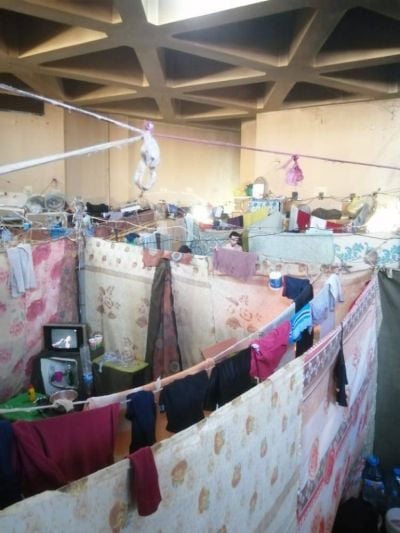
Roumieh prison, the largest in Lebanon. (Credit: Marwan Assaf/File)
BEIRUT — Overcrowded prisons, undernourished inmates, inadequate healthcare access to healthcare, rising deaths in custody.
The situation in Lebanese prisons has worsened since the onset of the economic crisis in 2019, according to a Human Rights Watch report published on Wednesday.
The figures for prison overcrowding put forward by the watchdog organization are staggering. Lebanon's largest prison, Roumieh, was designed to hold 1,200 inmates. Today, the prison houses some 4,000 inmates, according to the head of the Beirut Bar Association, quoted in the report.
Thousands in custody
Lebanon has a total capacity of 4,760 inmates in the country's roughly two dozen prisons, according to HRW. And yet, 8,502 people are detained and only 1,094 have been tried, according to the Internal Security Forces (ISF).
"Four of every five people in prison still waiting for a judge to rule on their cases, " Ramzi Kaiss, a Lebanese researcher for HRW, said in the report.
For the ISF, this situation is due to an "increase in crime rates, slow trial proceedings that have delayed release, and the inability of many prisoners who have served their sentences to pay fees required for their release," a police officer, who remained anonymous in the report, explained.
Still, in their monthly report at the beginning of August, the ISFs claimed that the number of reported crimes was down 38 percent since the beginning of 2023.
'Food even dogs wouldn’t eat'
This overcrowding leads to other problems.
More people behind bars increases the number of mouths to feed, as well as other expenses. In March 2021, top prosecutor Ghassan Oueidat launched an investigation following press reports of starvation risks in Lebanese prisons.
In 2022, the state had been unable to pay seven months' worth of bills to food suppliers, who threatened to halt deliveries. This decision would have deprived inmates in four Lebanese prisons of food. Following this incident, an emergency bill was passed to relieve overcrowding in prisons.
"The detainees’ family members said that access to food in prisons has dangerously deteriorated since the beginning of the economic crisis in 2019," the report noted.
In prior years, most prisoners relied on food brought in by their families or bought in prison "canteens," but during the COVID pandemic, inmates banned from family visits have become more dependent on food supplied directly by the prisons.
Though family visits are now allowed again, inflation has made food brought in from outside or available in prison supermarkets too expensive.
Demand for food deliveries is increasing, but the state, weakened by the depreciation of the Lebanese lira, is struggling to pay suppliers, as the ISF stated in its report.
"It’s food even dogs wouldn’t eat," the mother of a Roumieh inmate told HRW.
Twice as many inmates die behind bars
With poor access to medicine, the number of people dying in prison almost doubled in 2022 compared to 2018, according to HRW, citing Amnesty International.
Yet in 2022, the Italian Agency for Development Cooperation donated medicines worth 100,000 euros ($108,000) to Roumieh prison, according to the agency quoted in the HRW report.
But the situation does not seem to be improving. "Prisoners, their families... have said that the prison pharmacy still lacks basic medicines," the report said.
In Dec. 2022, prisoners' relatives complained to L'Orient-Le Jour about the spread of numerous skin diseases, "especially scabies." "There are no medicines, and if there are, they are often out-of-date boxes," one of the inmates confided at the time.
The ISF denied this information at the time: "These are exaggerated stories, lies. We will never give expired medicines to prisoners, even though everyone knows that a medicine can be used up to six months after its expiration date."
To alleviate the problem of prison overcrowding, the Lebanese government agreed in 2015 to allocate $30 million to build a prison in the town of Majdalya, in the Zgharta district. Then-Interior Minister Nohad Machnouk said the facility would be built in 18 months.
"Eight years later, the prison has still not been built," the report pointed out.
The full report can be found here.


